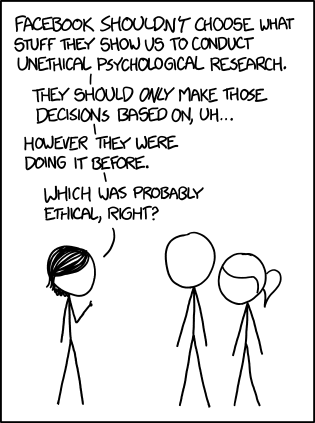 As this comic ‘Research Ethics’ from xkcd sums up, there is a lot of confusion (and ethical grey area) surrounding the role of companies like Facebook and how they control the flow of information in unprecedented ways. You may have come across reports about Facebook’s “emotional contagion” experiment and some anger and confusion over how this research was conducted and published. In this post I will link to some explanations about what happened and hypotheses on why it received the reaction it did. Why discuss a site most MSK staff can’t see from our desks? Basically, because this news highlights an interesting change in how we get information (as well as how we produce it) and I think it’s something worth considering. Continue reading
As this comic ‘Research Ethics’ from xkcd sums up, there is a lot of confusion (and ethical grey area) surrounding the role of companies like Facebook and how they control the flow of information in unprecedented ways. You may have come across reports about Facebook’s “emotional contagion” experiment and some anger and confusion over how this research was conducted and published. In this post I will link to some explanations about what happened and hypotheses on why it received the reaction it did. Why discuss a site most MSK staff can’t see from our desks? Basically, because this news highlights an interesting change in how we get information (as well as how we produce it) and I think it’s something worth considering. Continue reading
The Hachette-Amazon Battle and the Problem of the eBook.
 I had been hoping for a resolution before writing about the dispute between Amazon.com and the publisher Hachette Book Group, but there doesn’t seem to be an end in sight. For the past few months, the publisher and the online retailer have been engaged in a corporate battle over the distribution of eBooks. The conflict started back in May with Hachette titles losing their pre-order option on Amazon, there were weeks-long shipping delays on Hachette printed books, and some titles disappeared from Amazon altogether. The details are sketchy due to a gag order signed by both parties, but the dispute raises important questions about the roles of authors, publishers, and online vendors when it comes to eBooks. Continue reading
I had been hoping for a resolution before writing about the dispute between Amazon.com and the publisher Hachette Book Group, but there doesn’t seem to be an end in sight. For the past few months, the publisher and the online retailer have been engaged in a corporate battle over the distribution of eBooks. The conflict started back in May with Hachette titles losing their pre-order option on Amazon, there were weeks-long shipping delays on Hachette printed books, and some titles disappeared from Amazon altogether. The details are sketchy due to a gag order signed by both parties, but the dispute raises important questions about the roles of authors, publishers, and online vendors when it comes to eBooks. Continue reading
Scientific Data by Nature is New to the Collection!

Scientific Data, hosted by Nature Publishing Group, has recently been added to the MSK Library collection. The journal is an open-access, online-only publication for descriptions of scientifically valuable datasets.
Scientific Data’s main article-type is the Data Descriptor: peer-reviewed, scientific publications that provide an in-depth look at research datasets. Data Descriptors are a combination of traditional scientific publication content and structured information curated in-house, and are designed to maximize reuse and enable searching, linking and data mining. Each is peer-reviewed under the supervision of the journal’s Editorial Board. Scientific Data aims to address the increasing need to make research data more available, citable, discoverable, interpretable, reusable and reproducible. Continue reading